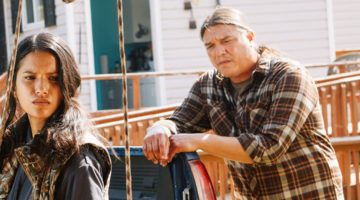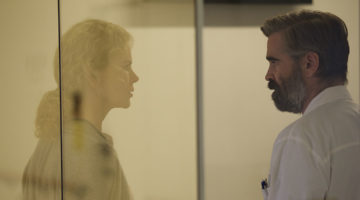Interview: Andrew Cividino Talks Sleeping Giant
One of the most anticipated Canadian premieres of TIFF this year is Sleeping Giant from director Andrew Cividino. It tells the story of Adam, a teenager who befriends cousins Nate and Riley over the course of a summer in Thunder Bay. While spending their ample free time causing mischief and mayhem, an event occurs that changes the nature of their relationship, and in the process leads to irrevocable damage to their perception of life itself. Based on a short of the same title that premiered at TIFF last year, the film has already garnered acclaim since its premiere at the Cannes Film Festival in May.
We spoke to Andrew Cividino about his experience making Sleeping Giant, and what resulted from turning the successful short into a narrative feature.
SC: This is your first feature, but its also an expansion of your short which screened at TIFF last year. What elements did you set to improve upon the second time around?
AC: I think going from the short to the feature, it was less about improving things and more about making sure that I wasn’t trying to rip myself off too much – allowing the feature to really be its own thing. I tried to draw on the strengths of the short, but not to emulate it directly.
SC: What challenges did you face working with a bigger budget and crew?
AC: I think the scope of the feature is the real difference. It’s a marathon; the months of prep and then the shooting itself, it’s a totally different experience. But it also allows you to get into more of a rhythm, and if you feel like a scene didn’t go perfectly in the short, you have a few days to think it over, to look at the footage and say ‘No, we need to find a way to reshoot this, or modify the story this way’. You have a lot more time to live in it, and I think that that actually is a luxury that short filmmakers don’t have.
SC: I found it interesting how the character dynamics between Adam, Nate, and Riley changed compared to the short. How did adding more story elements alter this relationship, and the film’s eventual outcome?
AC: I didn’t want to arbitrarily change it either, but the expanded relationships definitely changed the story. Of course, the biggest thing for me to get out of the short was recognizing in Nate and Riley’s characters that I had been missing an opportunity. It was a very Adam-focused film, and going into the feature I really wanted to make it more of an ensemble. To understand all three of these characters, where they are coming from and the challenges that they’re going through. I think that complexity became really the crux of the film for me, their dynamic and not just making it about Adam and ‘the other boys’.
SC: The three leads come across as very natural and uninhibited in their acting. In what aspect did improvisation factor into channeling their performances?
AC: The film was a combination of scripted and unscripted material. There was always a specific story and a narrative, but my job as director was to really balance serving that with allowing the boys to bring their own voice into it. They’re all very talented improvisers, so just allowing them to go and then write it back in was often the best way to lend naturalism to the piece.
SC: Are there any particular coming of age films, or films in general you look towards for inspiration?
AC: Certainly. In terms of style and approach, Andrea Arnold’s Fish Tank was a real touchstone for me. Richard Linklater’s Dazed and Confused was high on my list. Rob Reiner’s Stand by Me, of course, is a quintessential film. And then maybe Lord of the Flies as well. The wilderness and the sense of the casual cruelty of boys, and the complexity of their political dynamics, was something I found fascinating.
SC: How does it feel returning to TIFF a year later, especially with your film debuting earlier this year at the Cannes Film Festival in the Director’s Fortnight program?
AC: For me, coming to TIFF with a film, it feels like a world premiere all over again. TIFF is a huge international stage, and I think in many ways for North America it is genuinely where most people from not just Canada, but from the States will be seeing the film. It will ultimately be the festival that I think in many ways determines its fate, from a market perspective anyhow. So this feels like we’re ramping up to something just as big as May all over again, which comes with all the excitement and apprehension as well.
Sleeping Giant premieres at the Toronto International Film Festival on September 15th, at the Winter Garden Theatre. It’s second screening is on September 17th at TIFF Bell Lightbox.





